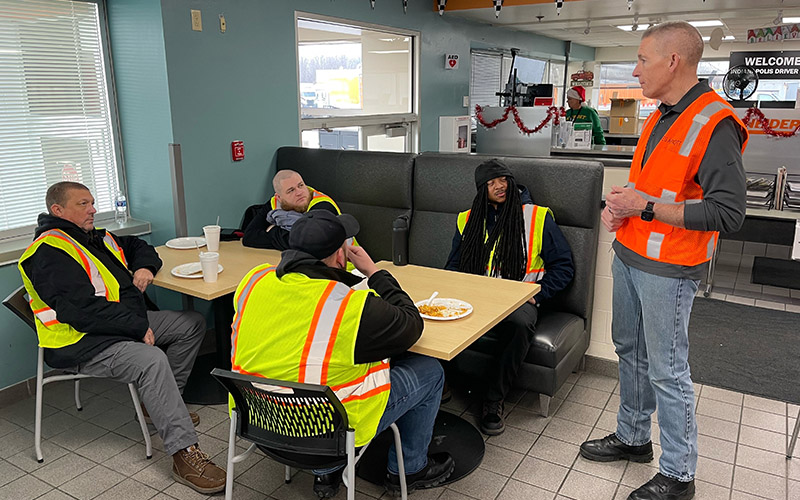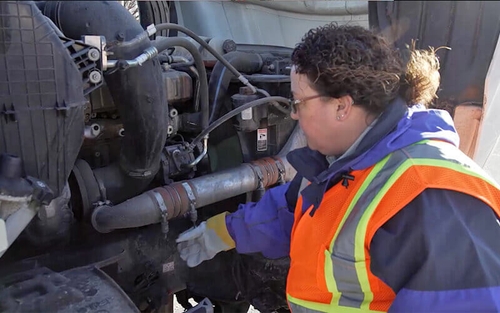Advice for new truck drivers: 10 tips you need to know


By Allie Palmer
Estimated reading time: 3 minutes
Starting any new career can be daunting. But becoming a truck driver, especially if you’ve never driven professionally before, can be an extremely rewarding experience.
Here are 10 pieces of advice for new truck drivers to help you be comfortable and successful in your new role.
10 tips for new truck drivers
1. Start every day with a thorough pre-trip inspection.
It doesn’t matter if your tractor-trailer was running properly yesterday. You still need to inspect it before you drive to focus on your safety and reduce the risk of breaking down.
Learn all about what goes into a comprehensive pre-trip inspection with our full checklist for truck drivers.
2. Dedicate time to your trip plan.
As you plan your day, you should think about:
- Where are you going to stop at the end of the day?
- How late is it going to be when you stop?
- What will the weather and road conditions be along your route?
- Will there be parking available when you want to stop?
- Is there any possibility of going over on your hours?
It can also be a good idea to write down your directions and daily schedule for later reference.
3. Utilize a weather app.
The forecast should always be considered when trip planning, and a weather app is one of the best resources to utilize. Poor weather conditions can impact your trip and your ETA, so you should make a habit of checking the weather both before your trip and during your stops, no matter the time of year.
You can also check how the weather is affecting road conditions by dialing 511 or visiting the state’s DOT website.
4. Use various resources for directions.
Get a comprehensive idea of where you’ll be driving by using more than one resource for directions:
- GPS on a company-provided tablet: Use a driver tablet (if your company provides one like Schneider does) to navigate where you are going.
- GPS apps: Use the satellite point-of-view to look at the locations where you will pick up and/or drop off loads.
- Atlas: Use an atlas to get a clear picture of where you will drive and to get a broader view of how you will get there.
- Pocket Truck Stop Guide: Use this tool to identify rest stops as you plan your day. This guide shows rest areas and truck stops, along with their size.
5. Be prepared to get lost.
Even with the best GPS unit, truck drivers get lost from time to time. Getting lost while operating a semi-truck can be a daunting experience, but there are a few key tips to keep in mind:
- Stay calm: When you realize you are lost, it’s important to remain calm and understand that nothing bad has happened yet. It is important not to panic.
- Avoid aimless driving: This is not the time to go exploring. Instead of driving aimlessly and hoping for the best, it’s better to find a safe and legal parking location and stop your truck.
- Make a plan: Once safely parked, use your map and/or GPS to chart a route back to your main course.
- Seek help if necessary: If you're still unable to find your way back, don't hesitate to contact the authorities for help.
- Focus on safety: There’s no shame in asking for help, but there is a lot of shame in damaging your equipment or other people’s property.
6. Pack according to the weather.
When preparing to leave home, always consider what you need to stay safe according to both the current forecast and what you may need if the weather changes suddenly.
- Packing for cold weather: Keep supplies such as a hat, gloves, warm clothing and a sleeping bag to ensure you can stay warm if you are stranded in cold-weather conditions.
- Packing for warm weather: In the warmer months, it’s important to focus on staying cool and hydrated to prevent any heat-related health issues.
Also, remember to always keep an all-seasons emergency kit with you in your truck.
7. Keep tools and spare parts on hand.
While it’s important to save the big fixes for dedicated mechanics, there are a few things you can probably resolve on your own when it comes to truck repairs. By carrying the supplies needed for these quick fixes, you can cut down on wait times and get back on the road faster.
Some examples of spare parts and tools to keep in your truck include:
- Hammers.
- An assortment of wrenches.
- A ratcheting screwdriver with an assortment of bits.
- Pliers.
- Air pressure and depth gauge.
- Flashlights with spare batteries and bulbs.
- Bungee cords.
- Zip ties.
- Spare wiper blades.
- Wiper fluid.
See what other items you should consider taking on the road with our full truck driver packing list.
8. Don’t be afraid to stop if conditions are unsafe.
While it is important to get your load delivered on time, it is much more important to keep yourself and those you share the roadways with safe.
If you are uncomfortable driving at any point, find a safe and legal parking location and wait until you are ready to return to driving. Don’t let others’ actions influence your decision.
9. Ask for help when you need it.
Recognizing that there’s nothing wrong with asking for help can help you stay safe and lead a successful career. Remember, all drivers were new truck drivers at one point, and many are happy to help you as you get started.
10. Be courteous to other drivers, and they will respond the same way.
Staying safe and taking your time will ensure you make your run and get back home. Practicing good etiquette on and off the road not only promotes safety but also fosters a more positive environment. Remember, a little patience and respect can go a long way in this profession.
By following these tips for new truck drivers, you will set yourself up for success in your new career.
Looking for more truck driver tips?

Allie is currently a Curriculum Development Specialist at Schneider. She started with Schneider in September 2018 and is a graduate from the University of Wisconsin-Oshkosh. In her free time Allie enjoys running, yoga, reading and photography.



